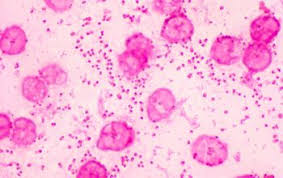 Caused by P multocida and Pasteurella septica.
Caused by P multocida and Pasteurella septica.
Pasteurellosis is a bacterial disease associated with animal bites and scratches.
Pasteurella spp is a normal bacterium that also lives in the mouths of healthy cats.
The bacteria do not typically make cats sick; however, cats can develop abscesses or skin infections in places where they were scratched or bitten by another animal.
In people, pasteurellosis causes painful wound and skin infections.
In severe cases, it can cause widespread infection and might even affect the nervous system.
Pasteurella
Pasteurella are small, facultatively anaerobic, fermentative coccobacilli, which are commonly found as commensals in the oropharynx of healthy animals.
Most human infections result from animal contact: animal bites, scratches, shared food.
P. multocida is the most common isolate and P. canis are human pathogens; the other Pasteurella species are rarely associated with human infections.
Pasteurella associated diseases:
localized cellulitis andlymphadenitis that occur after an animal bite or scratch-P. multocida from contact with cats or dogs;P. canis from dogs.
an exacerbation of chronic respiratory disease in patients with underlying pulmonary dysfunction.
A systemic infection in immunocompromised patients, particularly those with underlying hepatic disease.
Pasteurella have a polysaccharide capsule composed of hyaluronic acid which provides virulence in strains responsible for animal diseases and is likely to be important in human infections.
P. multocida is susceptible to a variety of antibiotics.
Penicillin is the antibiotic of choice, and expanded-spectrum cephalosporins, macrolides, tetracyclines, or fluoroquinolones are acceptable alternatives.
Semisynthetic penicillins, such as oxacillin, first-generation cephalosporins, and aminoglycosides have poor activity.
